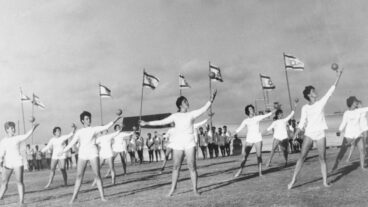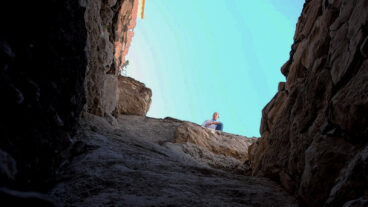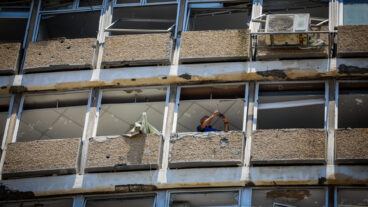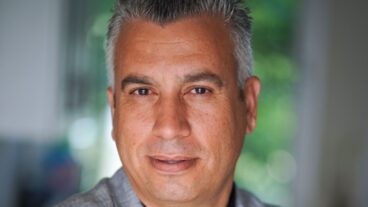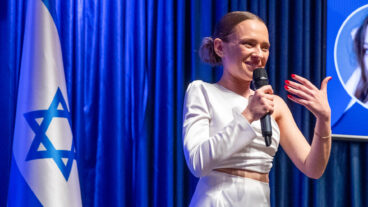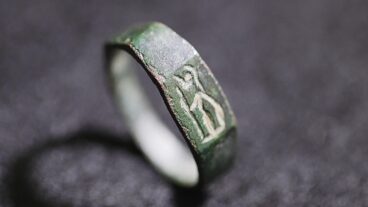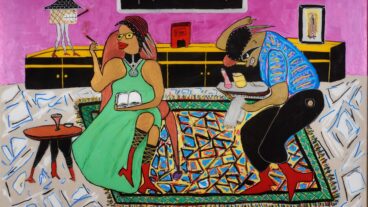Dov Yirmiya is still at it after 17 years of giving music lessons to Bedouin children in Israel’s Galilee region.The 1994 Subaru compact scurries up the narrow, curving road that leads to the Bedouin town of Kamana el-Sharkiyya. “Town” may not be quite the most apt term to describe the random collection of houses, many of them unfinished, that pepper the side of this hill, Mt. Kaman, a few miles to the east of the Western Galilee city of Karmiel. On the other hand, if the term “Bedouin” brings to mind semi-permanent tent settlements, around which dirty-faced children herd flocks of goats, then East Kamana defies the stereotype.
The car comes to a halt in front of a chain-link fence that encircles a pre-fab kindergarten. No children spending their morning hours as goatherds here: They’re all in school, the younger ones here, their older siblings at another nearby Bedouin town. The Subaru’s driver hops out and removes a large case from the trunk. His hair is closely cropped, and he wears blue jeans, a red-plaid flannel shirt, and Reebok walking shoes, all of which sit comfortably on his spry 86-year-old body as he bounds into the kindergarten. Dov Yirmiya has arrived.
Every two weeks Dov Yirmiya makes an unpaid appearance at four different Bedouin towns, and at each one he takes out his accordion and spends an hour leading the children, three to five years old, in songs and dances.
He is a Jew, a veteran of all of Israel’s wars, who during the 1948 War of Independence was even reported in one of the papers as deceased after being shot in the neck. He grew up with Moshe Dayan on the first moshav, Nahalal; helped establish Kibbutz Eilon, along the northern border; set up and ran the northern district of Israel’s Nature Reserves Authority: and has probably participated in more left-wing demonstrations than anyone in the country.
One might think that Israel’s Arabs needed a Jew to come teach them their folk music the way the residents of Newcastle need to import coal, but Yirmiya’s 17 years on the job is a sign he’s providing a valuable service. So is the reception he receives when he arrives at this morning’s first kindergarten, from both the children and the teachers. He encourages the kids to call him “Ziti Dov” – Grandfather Dov – and they seem to enjoy his presence almost as much as he does. He has prepared, and is constantly updating, a booklet with 40 songs, which he gives to the teachers, and a series of tapes, “for when I’m not here,” which he sells to them at cost.
Over the course of an hour, he has the 30 or so kids guess from the first notes what song he is about to play, leads them in an Arabic version of “Heveinu Shalom Aleikhem,” and has them act out a story in song. At one point he plays a traditional melody, and the kids divide to dance: the little boys forming a circle, arms on each other’s shoulder, and then making a train, and the girls holding hands in a circle. Yirmiya stands up and starts stomping his foot.
Yirmiya’s involvement with the Bedouin villages began when he joined a group from the left-wing Mapam party that had come to express support for two families whose homes were scheduled for demolition by the government because they were built without proper permits.
Yirmiya began his career as a traveling music teacher after taking an intensive course in literary Arabic. Between that and the spoken Arabic he began learning in his youth, Yirmiya’s command of the language is fluent.
Today, Yirmiya rotates his visits between four Bedouin towns, spending a total of two days every two weeks in the kindergartens. When asked if he has a hard time filling the rest of his days, he seems almost offended. First, there’s the memoir he’s been working on since 1995. Then there is the preparation for the music classes. Yirmiya has invested vast amounts of energy collecting, transcribing and recording the songs he plays. Today he has about 200 songs under his belt. He’s transcribed the music and words for 40 of them into the book he distributes among the teachers, and there is also the tape, which combines songs he sings and others.
The morning that began with a session in the kindergarten in Kamana el-Sharkiyya ends a kilometer or two to the west in Kamana el-Gharbiyya. He plays the same songs, tells the same stories – and is received with the same warmth and enthusiasm by the children. After the children each put on their tiny backpacks and head out the door, Yirmiya stays to schmooze with the teacher and her two assistants.
Following that, Yirmiya stows his accordion back in the trunk of his car, and leads me on a short tour. Tooling around the village, he slows down every time he passes someone, giving every resident a warm wave of his large hand. Everybody seems to know him, and when we stop to talk with some, they all want to tell me about his acts of generosity and support over the years – the construction work he did on the classrooms, the books and play equipment he brought, the steady political support. Children who have moved on to higher grades remember him and greet him.
Yirmiya traces his interest in music back to his teacher at Nahalal, Meshulam Levy. “There were still teachers like that then,” he recalls admiringly, more than seven decades later, “who taught everything, including music. Because of him, I learned to play the accordion and the violin, and to sing. He also taught us to be mensches.” Later, Yirmiya took a course for choir conductors, and studied music in Tel Aviv.
Clear as it is that Yirmiya’s visits to the children stimulate them and provide them with a positive image of Jews, one can’t help but wonder if the accordionist doesn’t keep at it because, as age encroaches and politics depresses, he simply takes pleasure in his visits. Is he doing it for himself as much as for them? He’s heard the question before, and readily acknowledges that the meetings with the children provide “instant gratification.” Then he adds, somewhat ruefully, “And if I stop, what else will I do?”




